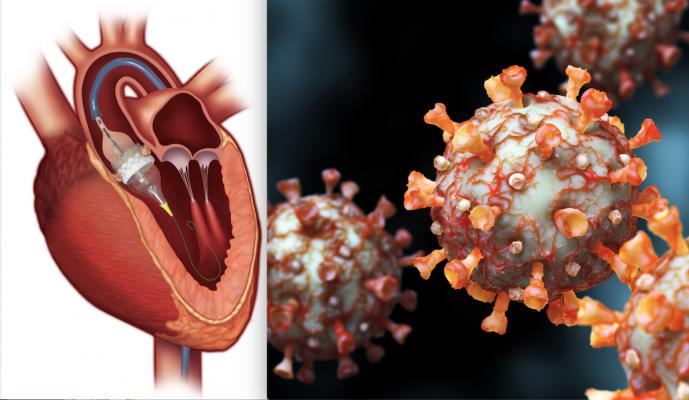
April 14, 2020 — There is a major challenge in balancing the risk of a delaying a needed valvular and structural heart disease (SHD) procedures against the risk of a susceptible patient being brought into the hospital during the COVID-19 pandemic. This prompted a new guidance document to be created jointly between the American College of Cardiology (ACC) and the Society for Cardiovascular Angiography and Interventions (SCAI).
The document, authored by the ACC Interventional Council, SCAI and ACC Cardiac Surgery Team and Leadership Council, was published in April 6 in the Journal of the ACC (JACC): Cardiovascular Interventions.[1]
A framework is provided to guide decision-making about the appropriate timing for an intervention, despite the ongoing pandemic, and addresses the triage of patients needing TAVR and percutaneous mitral valve repair, as well as procedural issues and considerations for the function of the structural heart disease team.
"Our recommendation is that all structural heart procedures be deferred, with the exception of patients who need a percutaneous mitral valve repair with a MitraClip who are inpatients who might have developed an acute decompensation, often secondary to a degenerative valve disfunction," said Etisham Mahmud, M.D., FSCAI, SCAI president and chief, Division of Cardiovascular Medicine at UC San Diego Medical Center, one of the co-authors on the document.
He said some patients will be fine if their procedures are delayed, but some cannot wait eight or more weeks for containment efforts to lift before getting a procedure.
"The one group of patients we feel should not be delayed are patients who need TAVRs. This does not mean every single TAVR should be done urgently, but the ones we feel should not be deferred are patients who have Class III or Class IV heart failure, patients who are presyncopal, patients with left ventricle disfunction due to deterioration of their critical aortic valve stenosis — those are patients we feel cannot be deferred."
The authors note that an added concern is the geographical variation in the peak of the pandemic in the U.S., which will pose distinct challenges for rescheduling procedures, potentially for many months, as normal health care operations are restored.
Four general priorities are outlined in the document:
1. minimize exposure to coronavirus for SHD patients and the structural interventional team;
2. maintain high quality and durable structural interventional outcomes in those who require a procedure during the pandemic;
3. reduce the risk that these SHD patients use resources that might be needed for COVID-19 patients; and
4. prevent delay of intervention in patients at particularly high risk for clinical deterioration, heart failure, and death. Local clinical judgment based on the impact of the COVID-19 pandemic in the region and institution should ultimately guide the evaluation and treatment pathway.
Regarding TAVR, the writing group proposes timing for patients with symptomatic severe aortic stenosis (AS), minimally symptomatic severe to critical AS, and asymptomatic severe to critical AS. Weekly telephone follow-up for patients whose procedures are deferred is recommended, and convening weekly virtual TAVR team meetings, with a single interventional cardiologist and cardiac surgeon assuming a leadership role and authority to arbitrate challenging cases.
Recommendations for transcatheter mitral valve procedures includes five patient groups who should be considered for edge-to-edge repair during the pandemic; deferral of valve-in-valve replacement.
Also addressed is paravalvular leak closure, other SHD interventions, and intra-procedural imaging. Telehealth consultations should be considered and coordination of pre-procedure visits and imaging to a single visit. A coordinated multidisciplinary effort needs to occur to safely defer and monitor SHD patients requiring interventional therapies.
Watch an interview with Mahmud on this document in the VIDEO: Triage Considerations for Structural Heart Patients During COVID-19 From ACC and SCAI.
VIDEO: Cancelling Non-essential Cardiac Procedures During the COVID-19 Outbreak — Interview with Ehtisham Mahmud, M.D.
Reference:

